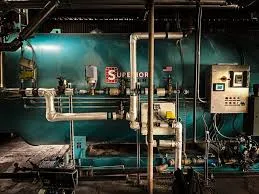ce certification commercial steam boiler
Understanding CE Certification for Commercial Steam Boilers
In an ever-evolving industrial landscape, the need for efficiency and safety in machinery has never been more pressing, particularly in the case of commercial steam boilers. These essential components play a pivotal role across various sectors, including manufacturing, food processing, and energy generation. To ensure that these systems operate safely and effectively, regulatory standards are imposed, among which the CE certification stands out as a crucial requirement in the European market.
What is CE Certification?
CE marking signifies that a product conforms to the health, safety, and environmental protection standards set by the European Union (EU). The marking is mandatory for certain product categories, including commercial steam boilers, and is a prerequisite for these machines to be sold in the European Economic Area (EEA). The 'CE' stands for Conformité Européenne, which translates to European Conformity.
The CE marking implies that the manufacturer has assessed the product and confirmed that it meets all relevant EU directives. For commercial steam boilers, this includes directives pertaining to safety, electromagnetic compatibility, and energy efficiency.
Importance of CE Certification for Commercial Steam Boilers
1. Safety Assurance The most critical aspect of the CE marking for commercial steam boilers is ensuring safety. These boilers operate under high pressure and temperature, making them susceptible to failures that could result in catastrophic incidents. CE certification mandates rigorous testing and adherence to safety standards, thereby reducing the risk of accidents.
2. Regulatory Compliance A business operating within the EEA must comply with local regulations. CE certification is not just a formality but a legal requirement that safeguards companies against penalties for non-compliance. Furthermore, having certified equipment can ease the process of auditing and inspections by regulatory bodies.
3. Market Access For manufacturers and distributors, CE certification opens doors in the European market. Without this certification, products may be rejected from being sold, resulting in significant financial losses. It not only boosts the product's marketability but also instills confidence in consumers regarding the safety and reliability of the product.
4. Environmental Considerations In addition to safety, CE certification also addresses environmental concerns. Many directives focus on reducing emissions and energy consumption, pushing manufacturers to develop more efficient and environmentally friendly products. This push aligns with the global trend towards sustainability, which is increasingly becoming a deciding factor for consumers and businesses alike.
ce certification commercial steam boiler

The Certification Process
Achieving CE certification for a commercial steam boiler involves a multi-step process
1. Assessment of Applicable Directives The manufacturer must first identify which EU directives apply to their product, typically the Pressure Equipment Directive (PED) for steam boilers.
2. Risk Assessment A thorough risk analysis is conducted to identify potential hazards associated with the product. The results guide the design and manufacturing process.
3. Testing and Compliance Manufacturers must ensure that their boilers undergo thorough testing in accredited laboratories to verify conformity with the relevant standards.
4. Technical Documentation Proper documentation is crucial. This includes design specifications, risk assessments, and records of testing. This documentation serves as proof of compliance and must be provided upon request by authorities.
5. Declaration of Conformity Once everything is in place, the manufacturer issues a Declaration of Conformity, stating that the product meets all necessary requirements. The CE mark can then be affixed to the product.
6. Ongoing Compliance CE certification is not a one-time affair. Manufacturers are required to monitor the performance of their products and update their compliance as necessary, particularly if any regulations change.
Conclusion
In conclusion, CE certification is a cornerstone in the regulation of commercial steam boilers in Europe. It ensures not only the safety and reliability of these vital machines but also aligns with the EU's goals for environmental protection. For manufacturers, obtaining CE certification is essential for accessing the European market, ensuring compliance, and showcasing a commitment to safety and quality. With the rising importance of industrial machinery in today's economy, understanding the implications of CE certification is crucial for businesses aiming to thrive in the competitive landscape.
-
Top Electric Steam Boiler Makers | AI-OptimizedNewsJul.31,2025
-
Top Electric Steam Boiler Manufacturers - High Efficiency SolutionsNewsJul.30,2025
-
Top Electric Steam Boiler Manufacturers – Efficient Industrial SolutionsNewsJul.29,2025
-
Top Electric Steam Boiler Manufacturers | Reliable Industrial SolutionsNewsJul.29,2025
-
OEM Steam Boiler Solutions for Custom Needs | High Efficiency & VersatilityNewsJul.29,2025
-
High-Efficiency Thermal Oil Boiler for Industrial Heating SolutionsNewsJul.29,2025

